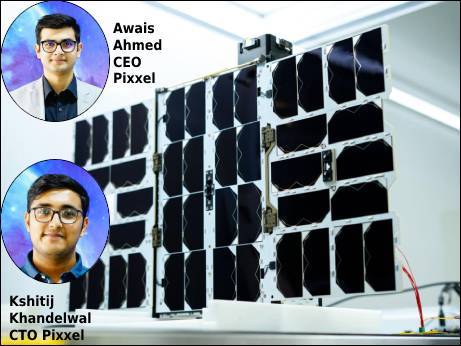
Cape Canaveral (US), April 6 2022: Bangalore and US based space technology startup Pixxel has announced the launch on April 1 of its first fully-fledged satellite hosting one of the highest resolution hyperspectral commercial cameras ever flown. The launch was done by a SpaceX Transporter-4 mission from Cape Canaveral.
This takes forward the company’s ambitious mission to assemble one of the world’s most advanced constellations of low-earth-orbit imaging satellites.
Says Pixxel co-founder-CEO Awais Ahmed: “From being one of the very few finalists in the SpaceX Hyperloop Pod Competition in 2017 to now launching our own satellites as part of SpaceX’s fourth dedicated rideshare mission, life has come full circle for Pixxel.” A Masters from BITS Pilani, Ahmed co-founded Pixxel in 2019 with with fellow BITS Pilani alumnus Kshitij Khandelwal. Earlier Ahmed and Kshitij led the designing, simulations and manufacturing of the hyperloop pod for Hyperloop India in 2016-17.
Weighing less than 15 kgs, TD-2 named “Shakuntala”, is capable of capturing orbital images in more than 150 bands of color from the visible and infrared spectrum with a resolution of 10-meters per pixel — far exceeding the specificity of 30-meter per pixel hyperspectral satellites launched by a few select organizations such NASA, ESA, and ISRO. In just a few weeks from launch, TD-2 will begin amassing information and uncovering the invisible changes wreaking havoc on our planet like natural gas leakages, deforestation, melting ice caps, pollution, and declining crop health. Imagine being able to predict a famine before a crop infestation takes over or stop an oil spill before it endangers delicate oceanic biospheres.
This launch also comes at the heels of Pixxel’s $25 million Series A funding from Radical Ventures, Seraphim Space Capital, Relativity Space co-founder Jordan Noone, Lightspeed Partners, Blume Ventures, and Sparta LLC among others. Their strategic backing joins the over 50 customers who have signed pre-launch agreements with us from industries spanning agriculture, oil and gas, mining, and climate sectors.
This launch sets the stage for Pixxel’s first commercial phase satellites to be launched in early 2023 and the commercial sale of our data. With 6 satellites flown in a sun-synchronous orbit (SSO) around a 550 km altitude, Pixxel’s hyperspectral constellation will be able to cover any point on the globe every 48 hours.
With even more satellites scheduled to launch in late 2023, Pixxel will achieve daily global coverage by early 2024. The learnings from the data beamed down by our constellation will provide us with a global scale perspective of planetary-scale ecosystems and biospheres that will be used to create an AI-informed analysis platform, helping us create a digital twin of the earth. This will be a critical tool in providing invaluable policy recommendations and actionable insights for climate-conscious governments and organizations. By detecting these unseen global phenomena and monitoring them through regular revisit, Pixxel is building a health monitor for Earth to help everyone make decisions that can make our world a better and more sustainable place.